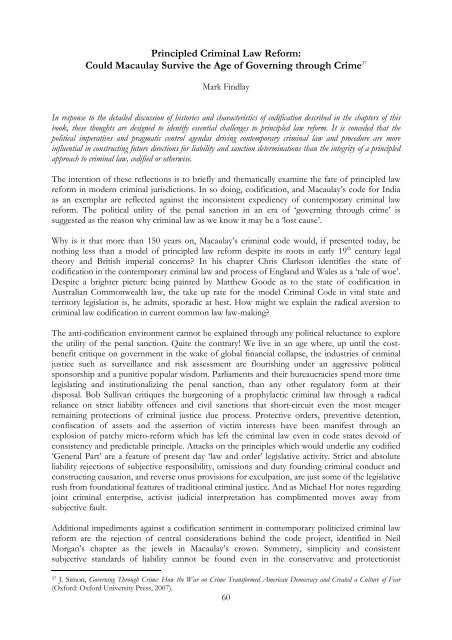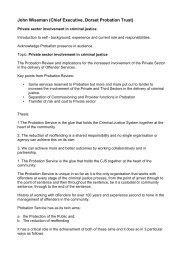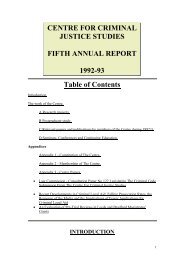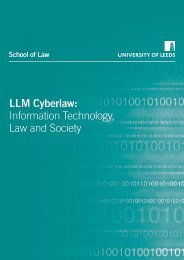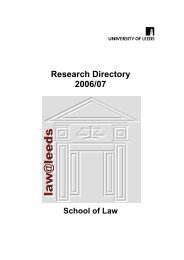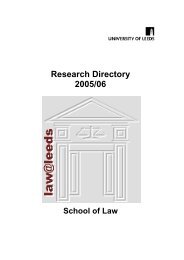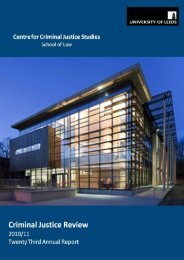Perceptions of Security and Reassurance at the ... - School of Law
Perceptions of Security and Reassurance at the ... - School of Law
Perceptions of Security and Reassurance at the ... - School of Law
You also want an ePaper? Increase the reach of your titles
YUMPU automatically turns print PDFs into web optimized ePapers that Google loves.
Principled Criminal <strong>Law</strong> Reform:Could Macaulay Survive <strong>the</strong> Age <strong>of</strong> Governing through Crime 37Mark FindlayIn response to <strong>the</strong> detailed discussion <strong>of</strong> histories <strong>and</strong> characteristics <strong>of</strong> codific<strong>at</strong>ion described in <strong>the</strong> chapters <strong>of</strong> thisbook, <strong>the</strong>se thoughts are designed to identify essential challenges to principled law reform. It is conceded th<strong>at</strong> <strong>the</strong>political imper<strong>at</strong>ives <strong>and</strong> pragm<strong>at</strong>ic control agendas driving contemporary criminal law <strong>and</strong> procedure are moreinfluential in constructing future directions for liability <strong>and</strong> sanction determin<strong>at</strong>ions than <strong>the</strong> integrity <strong>of</strong> a principledapproach to criminal law, codified or o<strong>the</strong>rwise.The intention <strong>of</strong> <strong>the</strong>se reflections is to briefly <strong>and</strong> <strong>the</strong>m<strong>at</strong>ically examine <strong>the</strong> f<strong>at</strong>e <strong>of</strong> principled lawreform in modern criminal jurisdictions. In so doing, codific<strong>at</strong>ion, <strong>and</strong> Macaulay’s code for Indiaas an exemplar are reflected against <strong>the</strong> inconsistent expediency <strong>of</strong> contemporary criminal lawreform. The political utility <strong>of</strong> <strong>the</strong> penal sanction in an era <strong>of</strong> ‘governing through crime’ issuggested as <strong>the</strong> reason why criminal law as we know it may be a ‘lost cause’.Why is it th<strong>at</strong> more than 150 years on, Macaulay’s criminal code would, if presented today, benothing less than a model <strong>of</strong> principled law reform despite its roots in early 19 th century legal<strong>the</strong>ory <strong>and</strong> British imperial concerns? In his chapter Chris Clarkson identifies <strong>the</strong> st<strong>at</strong>e <strong>of</strong>codific<strong>at</strong>ion in <strong>the</strong> contemporary criminal law <strong>and</strong> process <strong>of</strong> Engl<strong>and</strong> <strong>and</strong> Wales as a ‘tale <strong>of</strong> woe’.Despite a brighter picture being painted by M<strong>at</strong><strong>the</strong>w Goode as to <strong>the</strong> st<strong>at</strong>e <strong>of</strong> codific<strong>at</strong>ion inAustralian Commonwealth law, <strong>the</strong> take up r<strong>at</strong>e for <strong>the</strong> model Criminal Code in vital st<strong>at</strong>e <strong>and</strong>territory legisl<strong>at</strong>ion is, he admits, sporadic <strong>at</strong> best. How might we explain <strong>the</strong> radical aversion tocriminal law codific<strong>at</strong>ion in current common law law-making?The anti-codific<strong>at</strong>ion environment cannot be explained through any political reluctance to explore<strong>the</strong> utility <strong>of</strong> <strong>the</strong> penal sanction. Quite <strong>the</strong> contrary! We live in an age where, up until <strong>the</strong> costbenefitcritique on government in <strong>the</strong> wake <strong>of</strong> global financial collapse, <strong>the</strong> industries <strong>of</strong> criminaljustice such as surveillance <strong>and</strong> risk assessment are flourishing under an aggressive politicalsponsorship <strong>and</strong> a punitive popular wisdom. Parliaments <strong>and</strong> <strong>the</strong>ir bureaucracies spend more timelegisl<strong>at</strong>ing <strong>and</strong> institutionalizing <strong>the</strong> penal sanction, than any o<strong>the</strong>r regul<strong>at</strong>ory form <strong>at</strong> <strong>the</strong>irdisposal. Bob Sullivan critiques <strong>the</strong> burgeoning <strong>of</strong> a prophylactic criminal law through a radicalreliance on strict liability <strong>of</strong>fences <strong>and</strong> civil sanctions th<strong>at</strong> short-circuit even <strong>the</strong> most meagerremaining protections <strong>of</strong> criminal justice due process. Protective orders, preventive detention,confisc<strong>at</strong>ion <strong>of</strong> assets <strong>and</strong> <strong>the</strong> assertion <strong>of</strong> victim interests have been manifest through anexplosion <strong>of</strong> p<strong>at</strong>chy micro-reform which has left <strong>the</strong> criminal law even in code st<strong>at</strong>es devoid <strong>of</strong>consistency <strong>and</strong> predictable principle. Attacks on <strong>the</strong> principles which would underlie any codified‘General Part’ are a fe<strong>at</strong>ure <strong>of</strong> present day ‘law <strong>and</strong> order’ legisl<strong>at</strong>ive activity. Strict <strong>and</strong> absoluteliability rejections <strong>of</strong> subjective responsibility, omissions <strong>and</strong> duty founding criminal conduct <strong>and</strong>constructing caus<strong>at</strong>ion, <strong>and</strong> reverse onus provisions for exculp<strong>at</strong>ion, are just some <strong>of</strong> <strong>the</strong> legisl<strong>at</strong>iverush from found<strong>at</strong>ional fe<strong>at</strong>ures <strong>of</strong> traditional criminal justice. And as Michael Hor notes regardingjoint criminal enterprise, activist judicial interpret<strong>at</strong>ion has complimented moves away fromsubjective fault.Additional impediments against a codific<strong>at</strong>ion sentiment in contemporary politicized criminal lawreform are <strong>the</strong> rejection <strong>of</strong> central consider<strong>at</strong>ions behind <strong>the</strong> code project, identified in NeilMorgan’s chapter as <strong>the</strong> jewels in Macaulay’s crown. Symmetry, simplicity <strong>and</strong> consistentsubjective st<strong>and</strong>ards <strong>of</strong> liability cannot be found even in <strong>the</strong> conserv<strong>at</strong>ive <strong>and</strong> protectionist37 J. Simon, Governing Through Crime: How <strong>the</strong> War on Crime Transformed American Democracy <strong>and</strong> Cre<strong>at</strong>ed a Culture <strong>of</strong> Fear(Oxford: Oxford University Press, 2007).60


